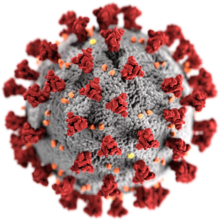User:Keisy29/sandbox
Covid-19 vaccine Pfizer Bivalent
[edit]Covid-19 disease Overview
[edit]
The disease of Covid-19 is brought on by SARS-CoV-2 virus. It can spread rapidly and is highly contagious. In the United stated, covid-19 Claimed the lives of more than a million people.
The respiratory symptoms that COVID-19 most frequently produces can resemble those of a cold, the flu, or pneumonia. More than just your lungs and respiratory system could be affected by COVID-19. The condition may also affect other areas of your body. Most of COVID-19 patients have minor symptoms, as some individuals develop serious illness.
When a person with COVID-19 breathes out droplets and extremely minute particles containing the virus, it spreads. These droplets and particles can land on other people's eyes, noses, or mouths, or they can be inhaled by other people. These drops could occasionally infect the surfaces they touch. Even those without symptoms who are infected with COVID-19 can spread the disease.
Some people are more likely to get COVID-19 than others. This applies to people who are old, have a weakened immune system, have certain injuries or health problems. Understanding your risk of COVID-19 and the risks that may affect others can help you make decisions to protect yourself and others.[1]
Covid-19 Vaccine Pfizer Bivalent
[edit]
The Pfizer Covid-19 vaccine, Bivalent, is a vaccine for prevention of COVID-19 that is authorized by the Food and Drug Administration (FDA) under the Emergency Use Authorization (EUA) for use in individuals aged 6 months and older. The vaccine may not protect everyone.
Pfizer vaccine is recommended for the prevention of Covid-19 disease. You or your child is being offered the Pfizer-Biotech COVID-19 Vaccine, Bivalent to prevent coronavirus disease 2019 (COVID-19) which is caused by the virus SARS-CoV-2. This fact sheet contains information to help you understand the risks and benefits of the Pfizer-Biotech COVID-19 Vaccine, Bivalent which you or your child may receive because there is currently a pandemic of COVID-19.
mRNA vaccines use mRNA created in a laboratory to teach our cells how to make a protein or even just a piece of a protein that triggers an immune response inside our bodies. The mRNA from the vaccines is broken down within a few days after vaccination and discarded from the body.
The Pfizer-Biotech COVID-19 Vaccine, Bivalent is given as an injection into the muscle. [1]
FDA has authorized the Pfizer-Biotech COVID-19 Vaccine, Bivalent to provide protection against COVID-19. [2]
Vaccine update
Updated vaccines, sometimes called “bivalent” vaccines
The updated vaccines are called “updated” because they protect against both the original virus that causes COVID-19 and the Omicron variant BA.4 and BA.5. Two COVID-19 vaccine manufacturers, Pfizer-Biotech and Moderna, have developed updated COVID-19 vaccines.
The updated vaccines are called “updated” because they protect against both the original virus that causes COVID-19 and the Omicron variant BA.4 and BA.5. Two COVID-19 vaccine manufacturers, Pfizer-Biotech and Moderna, have developed updated COVID-19 vaccines.
- Everyone aged 6 years and older should get 1 updated Pfizer-Biotech or Moderna COVID-19 vaccine to be up to date.
- People aged 65 years and older may get a 2nd dose of updated Pfizer-Biotech or Moderna COVID-19 vaccine.
- People who are moderately or severely immunocompromised may get additional doses of updated Pfizer-Biotech or Moderna COVID-19 vaccine.
- Children aged 6 months–5 years may need multiple doses of COVID-19 vaccine to be up to date, including at least 1 dose of updated Pfizer-Biotech or Moderna COVID-19 vaccine, depending on the number of doses they’ve previously received and their age.
- COVID-19 vaccine recommendations will be updated as needed.[3]
Risk and side effects:

• Severe allergic reactions
• Non-severe allergic reactions such as rash, itching, hives, or swelling of the face
• Myocarditis (inflammation of the heart muscle)[4]
• Pericarditis (inflammation of the lining outside the heart)[5]
• Injection site pain/tenderness
• Tiredness
• Headache
• Chills
• Joint pain
• Fever
• Injection site redness
• Nausea
• Swollen lymph nodes (lymphadenopathy)
• Decreased appetite
• Diarrhea
• Vomiting
• Arm pain
• Fainting in association with injection of the vaccine
• Dizziness
• Irritability
Other vaccines to prevent COVID-19 may be available under EUA, including bivalent vaccines that contain an Omicron component of SARS-CoV-2. COMIRNATY and SPIKEVAX (COVID-19 Vaccine, mRNA) are FDA-approved monovalent COVID-19 vaccines.
· Moderna[6]
· Novavax[7]
REFERANCES
- ^ "Pfizer Coronavirus Resources: Covid-19 Updates, News, Information". www.pfizer.com. Retrieved 2023-08-04.
- ^ Research, Center for Biologics Evaluation and (2023-07-14). "Pfizer-BioNTech COVID-19 Vaccines". FDA.
- ^ "COVID-19 Vaccination". Centers for Disease Control and Prevention. 2023-07-17. Retrieved 2023-08-04.
- ^ "Myocarditis - Symptoms and causes". Mayo Clinic. Retrieved 2023-08-04.
- ^ "Pericarditis - Symptoms and causes". Mayo Clinic. Retrieved 2023-08-04.
- ^ "COVID-19 Vaccine, Bivalent | Moderna | For Vaccine Recipients". eua.modernatx.com. Retrieved 2023-08-04.
- ^ "ACIP Evidence to Recommendations (EtR) for Use of Novavax COVID-19 Vaccine Booster Dose for adults ages 18 years and older under an Emergency Use Authorization | CDC". www.cdc.gov. 2023-05-11. Retrieved 2023-08-04.

